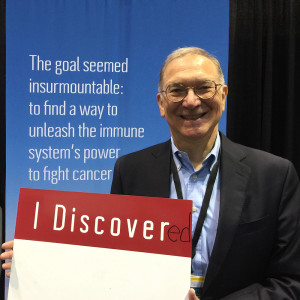Eagerly awaited new data from trials of immunotherapy drugs, vaccines to treat brain tumors, and improved treatments for blood cancers sparked waves of optimism at the year’s biggest cancer meeting.
The 2015 annual meeting of the American Society of Clinical Oncology (ASCO) drew about 30,000 cancer specialists to Chicago May 29 – June 2.
Immunotherapy, which uses drugs to block immune “checkpoints” such as PD-1 and PD-L1, allowing the patient’s immune system to attack cancer cells, drew standing-room-only audiences as researchers reported updated results in studies of melanoma, lung cancer, and brain cancer.

Investigators from Dana-Farber and Dana-Farber/Boston Children’s Cancer and Blood Disorders Center reported on new treatments for diseases including melanoma, gastric cancer, brain cancer, and ovarian cancer, as well as new developments around adult psychosocial and pediatric issues.
Chemo and genetic damage
Results of a new study could reassure cancer survivors that their chemotherapy won’t lead to genetic damage in children they conceive later.
Eliezer Van Allen, MD, and Mary-Ellen Taplin, MD, of Dana-Farber led a study using whole-genome sequencing to look for signs of genetic damage in two male cancer survivors and their offspring. The men had been cured of testicular cancer with combination chemotherapy, and both had children that were conceived before and after their treatment.
Obtaining DNA from saliva samples of the survivors and their offspring, the researchers scanned their genomes for signs of mutations and other DNA abnormalities. Van Allen reported that there was no increase in such abnormalities in the DNA of children whose fathers had undergone chemotherapy.
Vaccines to treat brain tumors
David A. Reardon, MD, clinical director of Dana-Farber/Brigham and Women’s Cancer Center’s Center for Neuro-Oncology, reported that an experimental vaccine combined with standard therapy continues to show an overall survival advantage in patients with glioblastoma whose tumors carry an EGFRvIII mutation.
Reardon is the lead investigator for the ReACT clinical trial and said the phase 2 results showed improved overall survival, long-term progression-free survival at six months, rate of tumor shrinkage, and reduced need for steroids.
“These data are compelling. They’re not a home run by any means, but they’re certainly a solid single, maybe even a double,” commented Reardon.
Read more:
- The Science of PD-1
- New Class of Drugs Shows More Promise in Treating Cancer
- Five Things to Know About Esophageal Cancer
Combination treatment for stomach and esophageal cancers
Adding bevacizumab to a standard drug combination markedly improved response rates and survival of patients whose metastatic stomach or esophageal cancers were driven by a mutated HER2 gene.
“I think this combination has promise,” said Peter Enzinger, MD, clinical director of the Center for Esophageal and Gastric Cancer at the Dana-Farber/Brigham and Women’s Cancer Center.
“There appears to be at least an additive effect between bevacizumab and trastuzumab, he said. The response rate was 81 percent, including 25 partial and two complete responses. Trastuzumab blocks the growth-stimulating effects of the HER2 mutation that is present in 15 to 20 percent of patients with esophageal and gastric cancer.
New study of ER-postitive breast cancer
Researchers led by Ann Partridge, MD, MPH, of the Susan F. Smith Center for Women’s Cancers found that adding ovarian suppression therapy to tamoxifen can improve breast cancer-free survival in young women with estrogen receptor-positive (ER-positive) tumors. However, this reduction in recurrences comes at a significant cost in side effects including hot flashes, night sweats, vaginal dryness, distractibility, and weight gain, researchers added.
Studying mental health of patients and parents
Cancer patients who used a Web-based tool to communicate with caregivers during treatment reported significantly less depression and social functioning than did patients in a control group, according to a study led by Donna Berry, PhD, RN, director of the Phyllis F. Cantor Center for Research in Nursing and Patient Care Services.
Patients in the trial used the Electronic Self-Report Assessment for Cancer (ESRA-C), to monitor their symptoms and quality of life in between clinic visits as well as to receive education about self-care.
Jonathan Marron, MD, of Dana-Farber/Boston Children’s, reported that parents who were fully informed about their child’s cancer prognosis – even when it was unfavorable – were more likely to feel hopeful and gain peace of mind, rather than becoming anxious and depressed.
Results of a survey of 353 parents of children newly diagnosed with cancer showed that fully informed parents were not significantly more anxious, depressed, or less hopeful than those who received less information. Jennifer Mack, MD, MPH, of Dana-Farber/Boston Children’s is the senior author of the report.
Exercise and quality of life
Cancer survivors who participated in a fitness program improved their physical activity, fitness, and quality of life, according to a study led by Jennifer Ligibel, MD, senior physician in the Susan F. Smith Center for Women’s Cancers, and a researcher from the Yale Cancer Center.
The 186 survivors in the study participated in the 12-week LIVESTRONG at the YMCA program. They gained significant increases in physical activity (75 percent exercising a minimum of 150 minutes/week compared to 25 percent for the control group); and improvements in both overall quality of life and fitness performance (according to a six-minute walk test).
